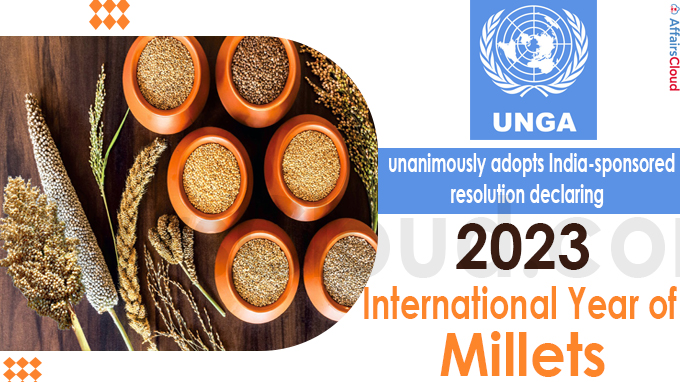
- The resolution titled ‘International Year of Millets 2023’ was supported by over 70 nations.
- Objective – To raise awareness about health benefits of the grain & suitability for cultivation under changing climatic conditions.
- Implementing Agency – The resolution called for the Food and Agriculture Organisation (FAO) of the United Nations to implement the International Year of Millets in 2023.
Benefits of International Year of Millets
- The adoption of resolution will invite enhanced investments in Research and development & extension services related to millets.
- It is also expected to create awareness about millet production which will contribute to Food security, nutrition, ensure livelihoods & incomes of farmers, poverty eradication.
- It will help in achieving the Sustainable Development Goals (SDGs) in regions which are drought prone or threatened by climate change.
- It will promote millets as one of main components of the food basket.
Fact
India celebrated 2018 as the National Year of Millets.
In April 2016, the UN General Assembly had proclaimed the UN Decade of Action on Nutrition from 2016 to 2025, recognising the need to eradicate hunger and prevent all forms of malnutrition worldwide.
Millets
- Millets are majorly grown in Asia & Africa (India, Mali, Nigeria & Niger). With 97% of millet production in developing countries.
- They are indigenous to many parts of the world. Most widely grown millet is pearl millet, which is an important crop in India & Africa.
Advantages of Millets
- Millets are resilient to climate change
- They can grow on poor soils with little or no external inputs
- Consume less water & can grow in non-irrigated conditions even in very low rainfall regimes
- Have a low Carbon & Water footprint (rice plants need at least 3 times more water to grow compared to millets).
- It is capable of withstanding high temperature.
Recent Related News:
i.On November 4, 2020, The First Committee of the UNGA under the chairmanship of H.E. Mr. Agustin Santos Maraver(Spain) adopted two India-sponsored resolutions on Nuclear Disarmament they are, ‘Convention on Prohibition of Use of Nuclear Weapons’ & ‘Reducing Nuclear Danger’ under the ‘Nuclear Weapons’ cluster.
About United Nations General Assembly (UNGA):
President – Volkan Bozkir
Headquarters – New York, USA